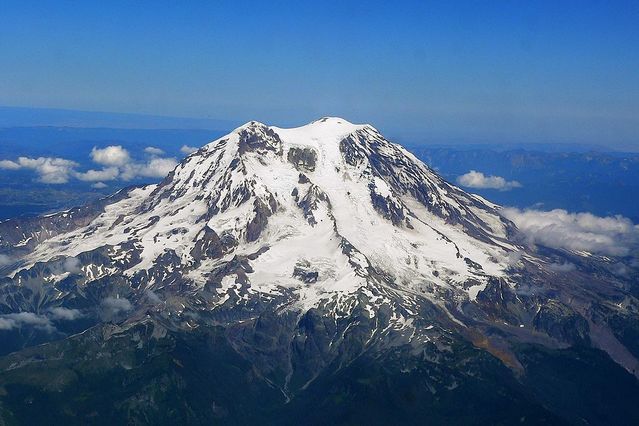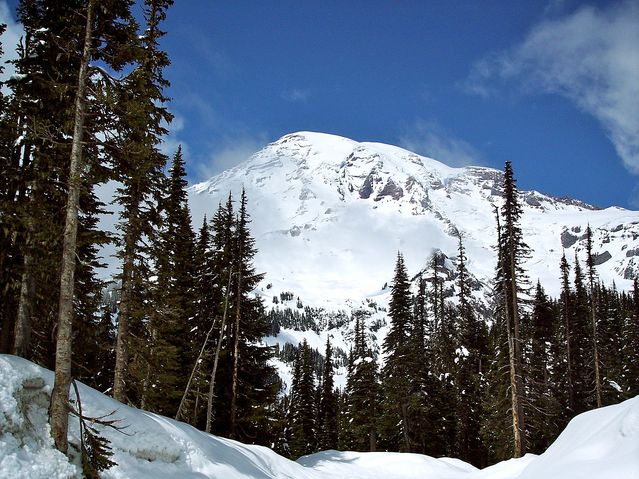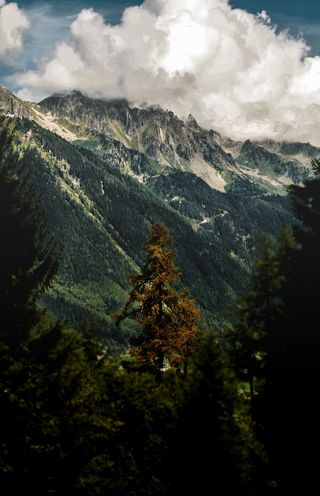Creativity
Do Mountains Inspire Creativity?
Why experiencing awe is good for us
Posted September 14, 2019 Reviewed by Kaja Perina
Melanie Rudd grew up within sight of Mount Rainier in Washington State. Now an Assistant Professor of Marketing at the University of Houston, she specializes in studies of awe. (In the strict sense, awe is defined as "an emotion variously combining dread, veneration, and wonder that is inspired by authority or by the sacred or sublime.")1 Most of us would probably never suspect that feelings of awe could open up our shuttered creativity. According to Rudd and her colleagues, mountain scenery, which serves up all-you-can-eat portions of awe, is the key.

"I’ve always been a mountain person in general," says Rudd. "My dad was a mountain climber: when I was growing up he climbed all the major peaks in the Pacific Northwest. As a little kid I was playing with crampons on, walking around in the backyard. I’ve always had that connection to mountains, so when I started doing research on awe, one of the obvious stimuli to use was mountains."
Rudd is co-author of a study in the Journal of Marketing Research2 that examines what motivates people’s willingness to learn and to create, specifically to engage in ‘experiential creation' – in this case, assembling trail-mix. It turns out that the hiker’s hunger-slaying confection can not only fuel your scramble up into the alpine, but also benchmark your creativity.

Rudd explains: “Experiential creation can be any activity where you play a direct role in the outcome as a creator. You’re not playing a passive role and watching someone else create. You’re not pushing a button and something pops out, created. You’re actually part of the experience. There’s a lot of research that shows how people get benefits from creating – not only because we value the things we create, but the act itself is very fulfilling.”
Rudd’s study examined subjects in the Swiss Alps: one group at the bottom of a mountain in a non-awe-inspiring environment, and the other at the top in a high-awe setting. “We measured the participants’ desire to create by having them choose either a pre-made trail mix, or make their own – trying to determine if those at the top of the mountain where it was more awe-inspiring would choose to create their own assortment (as opposed to those down in the parking lot by the beginning of the cable car line). We also gave them the opportunity to learn by offering both groups an educational brochure about hiking. So we measured both of those factors and saw that the people at the top were more open to learning and that this greater openness to learning made them more likely to create their own trail mix.”
The fact that the participants in the grip of awe wanted to take the time to create – even if it was pretty mundane stuff (cranberries, apricots, hazelnuts, cashews and raisins) – and learn more about their surroundings, was significant. And it was not the only upside to the high-mountain group’s experience.
"We used mountains in another experiment," Rudd continues, "where we randomly showed people one of three ads for a fake ski resort (which they didn’t know was fake) – one with an awe-inspiring picture of a mountain; another with a skier doing an exciting jump; and then a neutral picture of skis on a ski rack. And here we again saw [in the reaction to the mountain picture], a greater openness to learning and greater desire to create."
Awe Rewires Us to Create
“Generally when you’re experiencing positive emotions, you tend to rely on a lot of your existing knowledge," says Rudd. “You’re like, ‘I’m feeling good and I’m confident in my existing knowledge.' But something about awe is different: it makes you feel like you need to adjust your way of thinking, but not in a negative way. Most of the time, the idea of changing how you think is scary and threatening. But when you’re experiencing awe, it’s a positive feeling, and it reassures you that this is not a dangerous situation – this is a safe environment, so it’s OK to open your mind and think. When we’re feeling this way, our desire to create just shoots up.”

If we experience awe in a mountain setting for the first time, Rudd adds, “we have a hard time fully grasping this different thing, and this is especially true for people who didn’t grow up around mountains. A lot is happening in our brains – a lot of cognitive effort and emotion, a lot of different activation – when humans open themselves up to learning in this pure way. There’s something special about awe that does this. There’s a lot of research into different emotions serving different evolutionary functions – what purpose would this emotion serve? Why do we feel this way? And a lot of research on awe has indicated that it changes the way we think.3 And that is valuable from a survival perspective – that is what awe’s true function is – not just to make you feel good, but to change your brain.”
References
1. https://www.merriam-webster.com/dictionary/awe
2. Rudd, M., Hildebrand, C., & Vohs, K. D. (2018). Inspired to create: Awe enhances openness to learning and the desire for experiential creation. Journal of Marketing Research, 55(5), 766-781. https://doi.org/10.1509/jmr.16.0306, https://doi.org/10.1177/0022243718802853
3. For examples of recent research on awe, see https://greatergood.berkeley.edu/article/item/eight_reasons_why_awe_mak…


